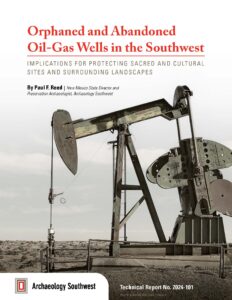- Home
- >
- Preservation Archaeology Blog
- >
- Emerging Attacks on Our Public Lands
(February 11, 2025)—Dramatic and harmful changes in Department of Interior management policies are beginning to emerge from the new administration. Last week, Interior Secretary Doug Burgum released Secretarial Order (SO) 3418. This order is meant to implement portions of Executive Order 14154: Unleashing American Energy. As advocates for the protection of cultural and historic sites, landscapes, and Traditional Cultural Properties (TCPs) across the country—and especially in the American Southwest—we at Archaeology Southwest identify the following provisions of the SO as the most problematic.
The plan to “review and revise all withdrawn public lands.”
This action will undoubtedly result in the revocation of the 2023 withdrawal of approximately 336,000 acres of land from mineral development in a 10-mile protection zone surrounding Chaco Culture National Historical Park, completed under former Interior Secretary Deb Haaland. This action also has direct implications for the boundaries of national monuments in Utah. Under the prior Trump administration, the Bears Ears and Grand Staircase-Escalante national monuments were drastically and illegally reduced in size. There is little reason to believe this won’t happen again.
The plan to “review all relevant regulations, policies, and guidance to ensure the lawful implementation of the section 106 of the National Historic Preservation Act (NHPA).”
This action is likely to gut the Section 106 process, which is often the final line of defense in the toolbox to protect cultural and historic sites, landscapes, and TCPs from rampant development. The NHPA has been targeted by prior administrations.
The plan to “prioritize reducing barriers to the use of Federal lands for energy development, consistent with the principle of multiple use.”
This action is shorthand for pushing oil-gas extraction, mining, and other energy development projects through without the thorough reviews required under Federal law for environmental and historic preservation concerns.
The plan for a “review that includes, but is not limited to, their processes, policies, and programs for issuing grants, loans, contracts, or any other financial disbursements of all appropriate funds from the Inflation Reduction Act of 2022 (Public Law 117-169) and the Infrastructure Investment and Jobs Act (Public Law 117-58).”
This action is troubling for many reasons, not least of which concerns the legality of interrupting the disbursement of funds that have been allocated by Congress and signed into law by the president. Specifically, this action will likely disrupt ongoing abandoned and orphaned well rehabilitation, as discussed in my report from last year.

There are many other extremely concerning issues raised by the DOI’s planned 15-day review of so many regulations that are at the heart of preserving and protecting special historical and cultural places across the landscapes of the US. As our friends at the Conservation Lands Foundation (CLF) have observed: “Conducting a slap dash, secret review of national monuments shows that this administration is scared of public scrutiny because they know how popular these public lands are.” CLF CEO Chris Hill also notes that “with roughly 85% of BLM lands already available for energy production—and roughly half of existing oil and gas leases not being used—it’s crystal clear that these recent orders targeting the 15% of public lands that are protected for the public’s use have nothing to do with the nation’s energy portfolio.” Indeed, America has been a net exporter of both oil and gas for more than a decade, dating back to the Obama Administration.
Sign the Monuments for All petition: Our Monuments Are Not for Sale
The freeze on Federal hiring and offer to buy-out existing employees is another area of significant concern. These actions have already resulted in the reduction of 1000s of jobs and will further result in the replacement of committed, career staffers with Trump loyalists who have different sensibilities and, more than likely, much less commitment to preserving landscapes. The National Park Service has already been impacted and will likely continue to be.
I recently went the radio with Scott Michlin, KSJE, San Juan College for my regular monthly guest spot. Our discussion focused on the DOI review; the administration’s hard push to bring oil-gas development back to the forefront of the economy, despite the tremendous gains in the much cleaner technologies of wind and solar; and the challenges for those of us who will continue to work tenaciously to protect the environment and the invaluable landscapes and places that hold people’s stories through millennia.
Although it is early in this new administration, we are already seeing dramatic, potentially destructive changes in DOI policy that are a threat to the sites, TCPs, and landscapes that so many of us care about. We are closely monitoring this rapidly evolving situation and will keep you informed.